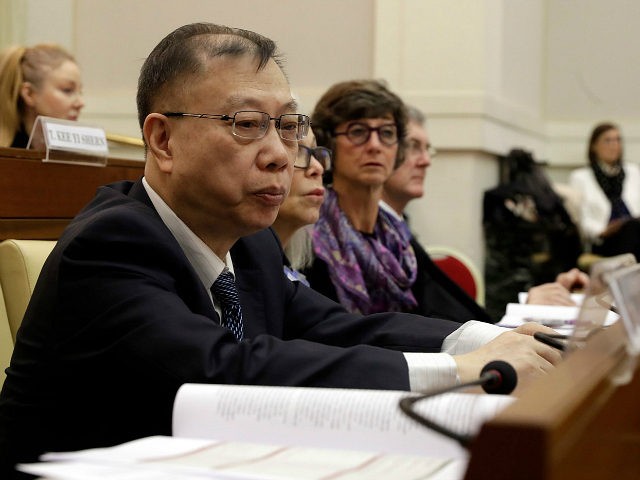The Vatican’s conference on organ trafficking included an awkward appearance from China, long accused of harvesting organs from prisoners.
The Associated Press writes of “sparks flying” as conference participants said they did not trust China’s assurances, and demanded an independent investigation to ensure the program has been discontinued:
Sparks flew in the afternoon session of the meeting as China’s former vice health minister, Dr. Huang Jiefu, sought to assure the international medical community that China was “mending its ways” after declaring an end to the prisoner harvesting program in 2015.
“I am fully aware of the speculation about my participation in the summit,” Huang told the conference, citing “continuing concerns about the transplant activities.”
He provided scant data to rebut critics, however, showing only two slides indicating an increased number of living and deceased donors in recent years and China’s recent efforts to crack down on black market transplant activities.
Preparing two slides does not sound like adequate preparation for a conference such as this, given China’s history of organ harvesting. Dr. Huang himself admitted to the existence of the program at 2005 and has said that up to ninety percent of the organs used in Chinese transplant surgeries came from prisoner harvesting.
China’s representatives at the conference essentially said their medical industry is too large to police — something that has never stopped the authoritarian nation from policing, say, the Internet — and asked for help from a World Health Organization task force.
Displeased by the refusal of China’s doctors to unambiguously state whether they still harvest organs from prisoners, the Vatican conference counter-offered with an arrangement that would include surprise inspections. The Chinese representatives took umbrage at that suggestion and pointed out that other nations aren’t subjected to surprise inspections, an argument that would seem to conflict with their assertion that China has a unique problem.
Dr. Huang’s objections also elude China’s infamous problems with providing transparent information about medical crises such as the SARS epidemic, as the Associated Press notes. At any rate, the article points out that WHO probably lacks the manpower for a regime of spot inspections, relying as it does on extensive cooperation from doctors and government agencies in member nations, and is also reluctant to engage in political arguments with participating governments.
The UK Guardian interpreted Huang’s remarks to the conference as tantamount to an admission that organ harvesting from prisoners is still taking place. “There is zero tolerance. However, China is a big country with a 1.3 billion population so I am sure, definitely, there is some violation of the law,” he said.
There is widespread skepticism that organs are being carved from dead prisoners by a few outlaws here and there. In fact, there is skepticism that the prisoners are completely dead before their organs are removed for transplant.
“They haven’t stopped the practice and won’t stop. They have a need for organ transplants that far outpace the availability of organs,” Amnesty International East Asia director Nicholas Bequelin told the Guardian.
The Vatican is working to crack down on organ trafficking, which Pope Francis has compared to slavery. “Organ transplantation must be at the service of life and involve free consent by the living donors or their legitimate representatives. Ascertaining the death of the donor must be diagnosed with certainty, especially when dealing with a child’s death,” state the latest bioethics guidelines from the Catholic Church.
Additionally, the Vatican declared that “not all human organs can be transplanted, such as the human brain, testicles, and ovaries, which are organs inseparably tied to a person’s unique and procreative identity.”
The organ trafficking conference organized by the Pontifical Academy of Sciences at the Pope’s personal request included representatives from 52 countries. “The data speaks for itself,” writes the Rome Reports news agency. “A Pakistani can sell a kidney for $2,000, and that same kidney will cost $80,000 in the United States. The biggest victims of this sinister business are the marginalized.”
Dr. Huang is quoted in the Rome Reports announcement: “This is a very important international meeting because of the noble identity of Pope Francis. I’m a surgeon, I know nothing about the diplomacy, however, this means that Chinese people wish to improve relations with the Vatican.”
However, the Vatican was criticized by some bioethicists and human rights activists for inviting Huang.
“The Pontifical Academy of Sciences should be aware of how the endorsements – even indirect – of prestigious foreign bodies are used by China’s propaganda apparatus to burnish the reputation of its unethical transplant system,” wrote Australian medical ethics expert Wendy Rogers in a protest letter quoted by the Guardian. “We urge the summit to consider the plight of incarcerated prisoners in China who are treated as expendable human organ banks. There is no evidence that this practice has ceased in China.”

COMMENTS
Please let us know if you're having issues with commenting.